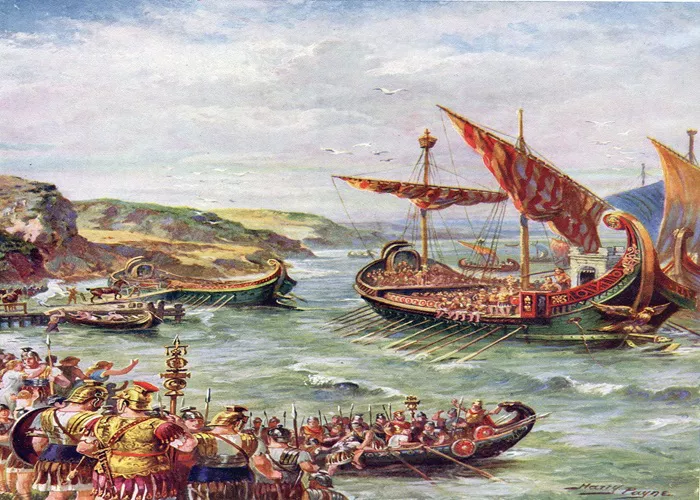January 1 has been a significant date in British history, marking various events that have shaped the nation over centuries. From military invasions to royal proclamations, this day is rich with historical moments that reflect the evolution of Britain. This article explores notable occurrences on January 1 throughout British history, providing detailed accounts of each event while maintaining clarity and accessibility.
What Happened on January 1 in British History?
Roman Invasion of Britain (55 BC)
On January 1, 55 BC, Roman General Julius Caesar invaded Great Britain for the first time. This marked a pivotal moment in British history as it initiated the Roman interest in the island. Caesar’s forces landed on the coast of Kent, gaining a beachhead that would lead to further military campaigns. His first incursion was primarily exploratory, aimed at assessing the potential for conquest and establishing alliances with local tribes.Caesar’s invasion was not just a military endeavor; it also had significant political implications. The Romans sought to expand their influence and control over new territories. Although this initial invasion did not result in permanent occupation, it set the stage for future Roman incursions and ultimately led to the full-scale conquest of Britain in AD 43 under Emperor Claudius.
The Coronation of Charles II (1651)
On January 1, 1651, Charles II was crowned King of Scotland at Scone, a village in Perth and Kinross. This event occurred during a tumultuous period in British history marked by civil war and political conflict. Charles II’s coronation was an attempt to solidify his claim to the throne amidst the ongoing struggles against the Parliamentarians.The significance of this coronation lies in its representation of royal legitimacy and continuity. Despite being crowned in Scotland, Charles II was also recognized as King of England after the Restoration in 1660. His reign would later be characterized by efforts to restore monarchy after years of republican rule under Oliver Cromwell.
The Start of Samuel Pepys’ Diary (1660)
January 1, 1660, is also notable for Samuel Pepys beginning his famous diary. Pepys documented his daily life and observations in London during a time of great change, including the Great Plague and the Great Fire of London. His diary provides invaluable insights into 17th-century British society, politics, and culture.Pepys employed an early form of shorthand to record his thoughts and experiences over nine years. His writings are celebrated for their detail and personal perspective, offering historians a unique glimpse into life during a transformative period in British history.
The Death of James Stuart (1766)
On January 1, 1766, James Stuart, known as ‘the Old Pretender’ and father of Bonnie Prince Charlie, died in Rome. His death marked the end of an era for Jacobite hopes of restoring the Stuart dynasty to the British throne. James had claimed legitimacy as King James III of England and VIII of Scotland but never ruled.His burial in St. Peter’s Basilica reflects his status among Jacobites as a symbol of royal lineage and hope for restoration. Following his death, Bonnie Prince Charlie became the focal point for Jacobite aspirations until his own failed uprising in 1745.
The First Traveller’s Cheques (1772)
Another significant event on January 1 occurred in 1772 when the London Credit Exchange Company issued the first traveller’s cheques. These cheques were revolutionary for their time, providing a safer alternative for travelers who needed to carry money abroad.The introduction of traveller’s cheques facilitated international travel and commerce by reducing the risk associated with carrying large sums of cash. This innovation reflects broader trends towards modernization and economic development during this period.
The First All-Iron Bridge (1781)
On January 1, 1781, the world’s first all-iron bridge was completed across the River Severn at Coalbrookdale. Designed by Abraham Darby III, this engineering marvel showcased advancements in metallurgy and construction techniques.The bridge represented a significant achievement in industrial engineering and became an iconic symbol of the Industrial Revolution in Britain. It facilitated transportation and trade while demonstrating the potential for iron as a building material.
Proclamation of Queen Victoria as Empress of India (1877)
January 1, 1877, saw Queen Victoria proclaimed Empress of India during a grand ceremony at Delhi Durbar. This event marked a formal declaration of British sovereignty over India following the Indian Rebellion of 1857.Victoria’s title emphasized Britain’s imperial ambitions and its role as a global power during this period. The proclamation symbolized both authority over India and an attempt to integrate Indian governance into British imperial identity.
The Sinking of HMS Formidable (1915)
On January 1, 1915, during World War I, the British battleship HMS Formidable was torpedoed by a German submarine in the English Channel. The attack resulted in the loss of over 500 crew members.This tragedy underscored the dangers faced by naval forces during wartime and highlighted vulnerabilities within Britain’s maritime defenses. The sinking contributed to discussions about naval strategy and security throughout World War I.
The Declaration by United Nations (1942)
January 1, 1942, marked another pivotal moment when twenty-six countries signed the Declaration by United Nations in Washington D.C., reaffirming their commitment against Axis powers during World War II.This declaration laid down principles that would guide cooperation among allied nations throughout the war. It established a framework for collective security that would later evolve into what is now known as the United Nations.
Conclusion
January 1 has witnessed numerous significant events throughout British history that have shaped its political landscape, cultural identity, and social fabric. From military invasions to royal proclamations and innovations in finance and engineering, each occurrence reflects broader historical trends that continue to influence Britain today.Understanding these events provides valuable insights into how past actions have shaped contemporary society and governance within Britain. As we reflect on this date’s historical significance, it becomes clear that January 1 is more than just a new beginning; it is a reminder of Britain’s rich tapestry woven through centuries of change and continuity.
Related Topics:

